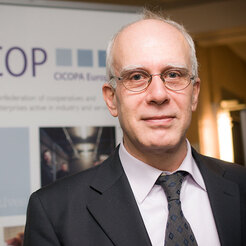|
Bruno Roelants
Diretor-Geral
da Aliança Cooperativa Internacional Director-General of the International Cooperative Alliance |
DIA INTERNACIONAL
|
|
Em 1923, a ACI lançou o Dia Internacional das Cooperativas e, em 1995, passou a ser um dia das Nações Unidas. É uma oportunidade anual para as cooperativas celebrarem a sua identidade cooperativa e recordarem o resto do mundo sobre esta celebração. Numa situação mundial em que as cooperativas deviam ser mais conhecidas, tendo em conta os números estimados (3 milhões de empresas, mais de 1 mil milhão de sócios, cerca de 10 % do emprego global), o Dia Internacional das Cooperativas continua a ser um dos principais canais através dos quais estas se podem manifestar regularmente. Ser um dia das Nações Unidas é também uma vantagem tangível, por envolve a Comissão das Nações Unidas para a Promoção e Progresso das Cooperativas, a COPAC, que inclui o Departamento das Nações Unidas para Assuntos Económicas e Sociais, a OIT, a FAO, o World Trade Center e o ICA, e organiza regularmente uma reunião em Nova Iorque para o Dia Internacional em circunstâncias normais. Mesmo com a pandemia, esta reunião centrada nas Nações Unidas decorreu online. Assim, o Dia Internacional das Cooperativas também é um importante canal para recordar a existência das cooperativas dentro do sistema das Nações Unidas.
O tema deste ano trata a forma como o modelo de negócio empresarial, enquanto modelo, pode ajudar a construir um mundo melhor. Vamos analisar sucessivamente estas duas componentes do tema deste ano, nomeadamente o modelo de negócio empresarial e o mundo melhor. a) O modelo de negócio empresarial As cooperativas caracterizam-se por um modelo de negócio com um conjunto de padrões mínimos elaborados pela primeira vez em 1844 em Rochdale, em Inglaterra, e depois acordadas como normas de cooperação globais dentro da Aliança Cooperativa Internacional, pois esta última nasceu em 1895. Estes padrões mínimos sofreram então três alterações sucessivas, sendo a última e mais completa a Declaração da ICA sobre a Identidade Cooperativa, aprovada por ocasião do 31º Congresso Cooperativo Mundial em 1995, após anos de consulta dentro do movimento cooperativo. Essas normas incluem a definição de cooperativa, sete princípios operacionais e dez valores subjacentes, e foram então reconhecidas em 2002 pela comunidade internacional, incluindo governos, sindicatos e entidades patronais através da Recomendação de Promoção das Cooperativas n° 193 da OIT. Foram apresentadas no 33º Congresso Mundial cooperativo convocado em dezembro de 2021 em Seul, com o título “Aprofundamento da nossa Identidade Cooperativa”: o Congresso analisou a forma como estas normas permitem que as cooperativas contribuam para enfrentar os grandes desafios atuais, como emprego, crises económicas, ambiente, paz, igualdade, alimentação, habitat etc. e ser, ao mesmo tempo, mais competitivo. b) O mundo melhor A expressão “mundo melhor” é um piscar de olho ao slogan do Ano Internacional das Cooperativas da ONU (2012), do qual estamos a comemorar o 10º Aniversário este ano. Está relacionada com os Objetivos de Desenvolvimento Sustentável das Nações Unidas, embora tenha a sua origem muito antes do seu aparecimento e continuará a existir muito depois de o período dos ODS terminar em 2030, uma vez que a visão do movimento cooperativo existe a longo prazo. De facto, a definição de cooperativa, tal como vem consagrada na Declaração da ICA sobre a Identidade Cooperativa e na Recomendação 193 da OIT, foca-se no facto de as cooperativas pretenderem satisfazer as necessidades comuns das pessoas, geralmente necessidades básicas, como trabalho, crédito, educação, saúde, produção, consumo etc., e, com a satisfação dessas necessidades através de empresas com vários sócios e administradas de forma democrática, trabalhando para o desenvolvimento sustentável das comunidades em que estão inseridas (segundo o sétimo princípio de cooperação). Estas são necessidades a longo prazo e, simultaneamente, evoluem ao longo do tempo: é por isso que os feedbacks abundantes e contínuos enviados pelos sócios sobre as suas necessidades estão aos poucos a destacar cada vez mais as questões ambientais. A contribuição das cooperativas para um mundo melhor também requer o estabelecimento de parcerias fortes, primeiro com os outros agentes da economia social e solidária (ESS). É por isso que a ICA estabeleceu recentemente uma Aliança Internacional da ESS (ICSSE) com outras organizações representativas globais da ESS, com as quais coordenamos a nossa contribuição para os debates em curso sobre a ESS na ONU e na OIT. Com o aumento das desigualdades, o ressurgimento de conflitos, o regresso das pandemias, os grandes desafios ambientais e outros desafios, o mundo não ficará, certamente, em boas condições. No entanto, encontra-se também numa encruzilhada, com escolhas fundamentais que os seres humanos terão de fazer como nunca antes o fizeram na sua história. É uma oportunidade fundamental para as cooperativas e outros elementos da ESS trabalharem em conjunto para contribuir para enfrentar estes desafios, algo fundamental para a humanidade. |
In 1923, the International Day of Cooperatives was launched by the ICA and, in 1995, it became a UN day. It is an annual opportunity for cooperatives to celebrate their cooperative identity and remind the rest of the world about it. In a world situation in which cooperatives should be better known, considering their estimated numbers (3 million enterprises, over 1 billion members, about 10% of global employment), the International Day of Cooperatives remains one of the main channels through which they can regularly manifest themselves. The fact that it is a UN day is also a tangible advantage, as it involves the UN Committee for the Promotion of Cooperatives, COPAC, which comprises the UN Department of Economic and Social Affairs, the ILO, the FAO, the World Trade Centre and the ICA, and regularly organises a meeting in New York for the International Day under normal circumstances. Even with the pandemic, this UN-centred meeting has taken place on line. Thus, the International Day of Cooperatives is also an important channel to remind cooperatives’ existence within the UN system.
This year’s theme is on how the cooperative business model; as a model, can help build a better world. Let us examine successively these two components of this year’s theme, namely the cooperative business model and the better world. a) The cooperative business model Cooperatives are characterised by a business model which is characterized by a series of minimum standards that where first elaborated in 1844 in Rochdale, England, then agreed upon as global cooperative standards within the International Cooperative Alliance since the latter was established in 1895. These minimum standards then underwent three successive modifications, the last and most complete version being the ICA Statement on the Cooperative Identity, approved at the occasion of the 31st World Cooperative Congress in 1995, after years of consultation within the cooperative movement. These standards include the definition of a cooperative, seven operational principles and ten underlying values, and they have then been recognised in 2002 by the international community, including governments, trade unions and employers organisations through ILO Promotion of Cooperatives Recommendation n° 193. They have been the object of the 33rd World Cooperative Congress convened in December 2021 in Seoul, called “Deepening our Cooperative Identity”: the Congress explored how these standards allow cooperatives to contribute to meeting today's big challenges such as employment, economic crises, the environment, peace, equality, food, habitat etc., and at the same time be more competitive. b) The better world The expression “better world” is a hint at the slogan of the UN International Year of Cooperatives (2012) of which we are celebrating the 10th Anniversary this year. It has to do with the UN Sustainable Development Goals, but finds its origin long before them and will be pursued long after the SDG period ends in 2030, as the cooperative movement’s vision is a long term one. Indeed, the definition of a cooperative as it is enshrined in the ICA Statement on the Cooperative Identity and in ILO Recommendation 193, focuses on the fact that cooperatives aim to meet people's common needs, usually basic needs, such as work, credit, education, health, production, consumption etc., and, with the satisfaction of these needs through jointly owned and democratically controlled enterprises, to act for the sustainable development of the communities in which they are embedded (as per the seventh cooperative principle). These needs are long term ones and, simultaneously, they evolve over time: this is why the large and continuous feedback cooperative members send out about their needs is gradually putting increasing emphasis on environmental issues. Cooperatives’ contribution to a better world also requires building strong partnerships, and first of all with the other actors of the social and solidarity economy (SSE). This is why the ICA has recently established an International Coalition of the SSE (ICSSE) with other global SSE representative organisations, with whom we coordinate our contribution to the ongoing debates on the SSE at the UN and at the ILO. With the increase of inequalities, the resurgence of conflicts, the return of pandemics, the big environmental challenges, and other challenges, the world is certainly not in a very good state. However, it is also at a crossroads, with fundamental choices which human beings will have to do like never before in their history. It is a key opportunity for cooperatives and other components of the SSE to work together to contribute to meeting these challenges, which is vital for humanity. |


